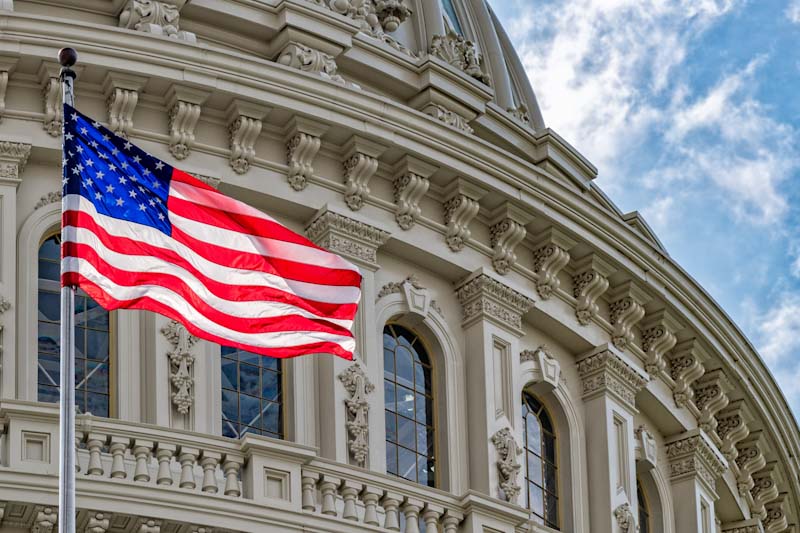This website uses cookies so that we can provide you with the best user experience possible. Cookie information is stored in your browser and performs functions such as recognising you when you return to our website and helping our team to understand which sections of the website you find most interesting and useful.
News
Legislative Update: Plastics Legislation at the Forefront
Water Infrastructure
The U.S. Government Accountability Office (GAO) is examining ways to better prepare for extreme weather events and the potential effects of climate change. The independent, nonpartisan agency is recommending that the U.S. Environmental Protection Agency (EPA) identify technical assistance providers and engage them in a network to help water utilities incorporate climate resilience into infrastructure projects. The agency also says Congress should consider requiring that climate resilience be considered in planning for federally funded water infrastructure projects.
GAO released its recommendations in a new Feb. 13 study “Water Infrastructure: Technical Assistance and Climate Resilience Planning Could Help Utilities Prepare for Potential Climate Change Impacts.” GAO reviewed federal technical and financial assistance from four federal agencies —EPA, Federal Emergency Management Agency (FEMA), U.S. Department of Housing and Urban Development (HUD), and the U.S. Department of Agriculture (USDA)—to make water infrastructure more resilient to extreme weather and asked experts about additional options. The agency noted that EPA’s current technical program is too small to assist utilities nationwide. It is seeking that EPA organize a network of technical advisors, including federal and state agencies, universities, and industry groups, that could be organized to assist nationally.
The study also notes that Federal agencies have taken some actions to promote climate resilience when providing financial assistance for water infrastructure projects but does not consistently consider climate resilience when funding such projects. This requirement could shift financial aid for future disaster recovery to assistance for preventative drinking water and wastewater infrastructure-related projects.
Plastics Legislation
Sen. Tom Udall (D-NM) and Rep. Alan Lowenthal (D-CA) have officially introduced their recycling legislation “Break Free from Plastic Pollution Act” that shifts the financial responsibility of recycling to the companies that produce plastic products. The H.R. 5845 and S. 3263 were also introduced with Sen. Jeff Merkley (D-OR) and Rep. Katherine Clark (D-MA) and currently have 34 Democratic cosponsors in the House and six Democratic cosponsors in the Senate.
The legislation would phase out single-use plastic products and extends the responsibility on producers by requiring them to design, manage, and finance programs for end-of-life management of their products and packaging as a condition of sale. There are several extended producer responsibility (EPR) bills at the state level, too.
The bill also requires a national container deposit law and a collection target for single-use plastic bottles in hopes that to create incentives to shift to more sustainable products. The fees would be redistributed to states and affected communities for investments in waste minimization, pollution reduction, recycling, safe disposal, and innovation research. Furthermore, the bill would prohibit the export of plastics, including polyethylene, polypropylene, vinyl chloride, and PVC from being shipped to developing countries. The legislation also calls for a three-year moratorium on new plastic facilities until the EPA updates and creates regulations on those facilities.
As previously reported, the Vinyl Institute has several concerns with the consequences from this legislation would have on the businesses, industries, and U.S. jobs throughout the supply chain that depend on the plastics industry to provide consumer goods. These measures single out one material rather than looking toward the innovative advances in plastics recycling that would benefit the environment and provide new recycling management options for plastic waste.
Reps. Brian Mast (R-FL) and Susan Bonamici (D-OR) introduced the bipartisan “MICRO Plastics Act” (H.R. 5902) to combat ocean plastic pollution last week. The new legislation directs the EPA to test new, innovative ways to remove microplastics and prevent them from entering our waterways. Specifically, this legislation would require the EPA to establish a pilot program that would test the effectiveness and cost of existing tools used to mitigate microplastics in our waterways. The bill also directs the EPA to test a variety of possible solutions to accomplish this goal, including natural infrastructure, green infrastructure, mechanical removal, filtration, and more. Senators Jeff Merkley (D-OR), Lindsay Graham (R-SC), Susan Collins (R-ME), Chris Coons (D-DE), and Tammy Duckworth (D-IL) also introduced companion legislation (S. 3306) in the Senate last week.


